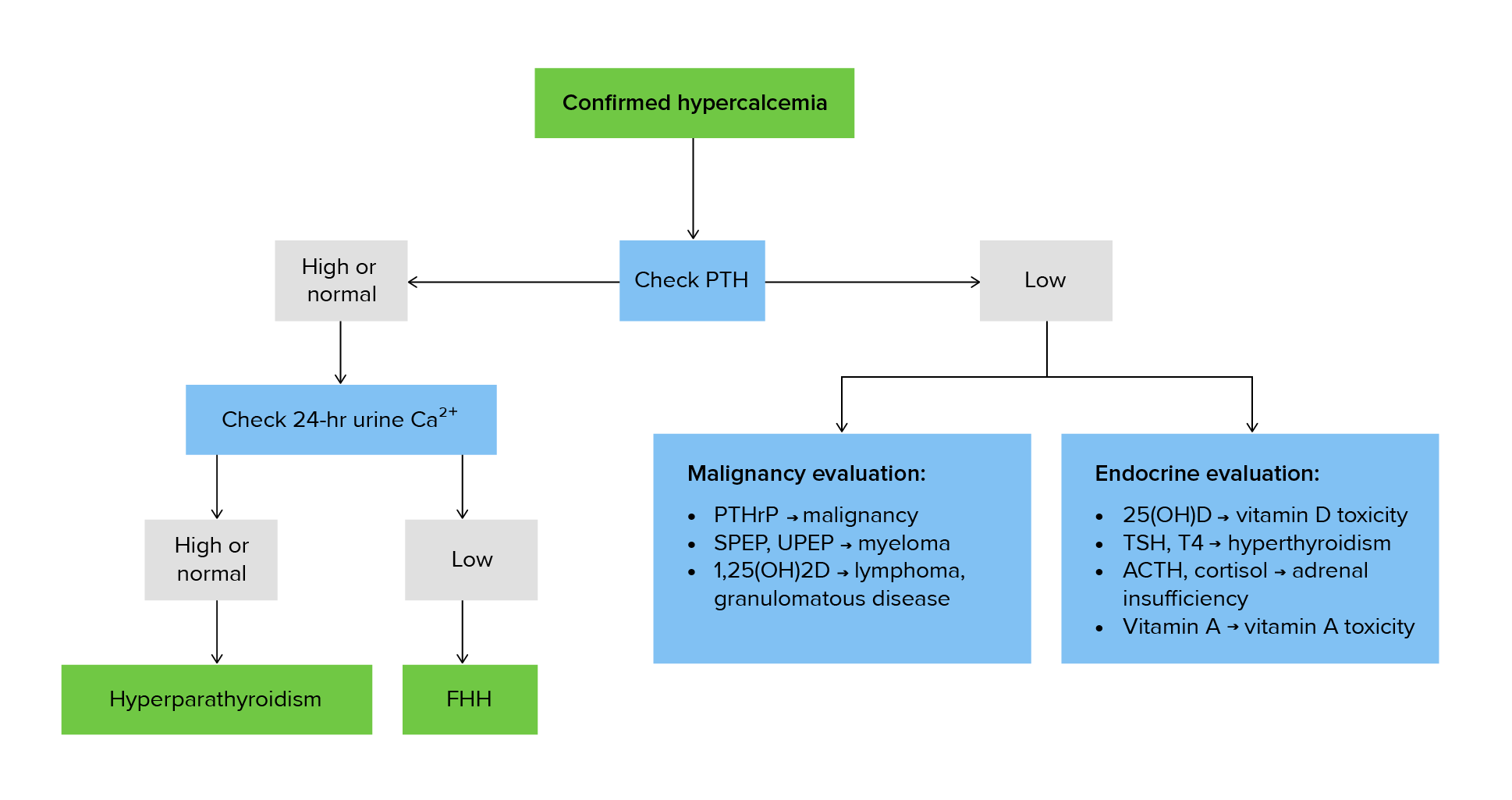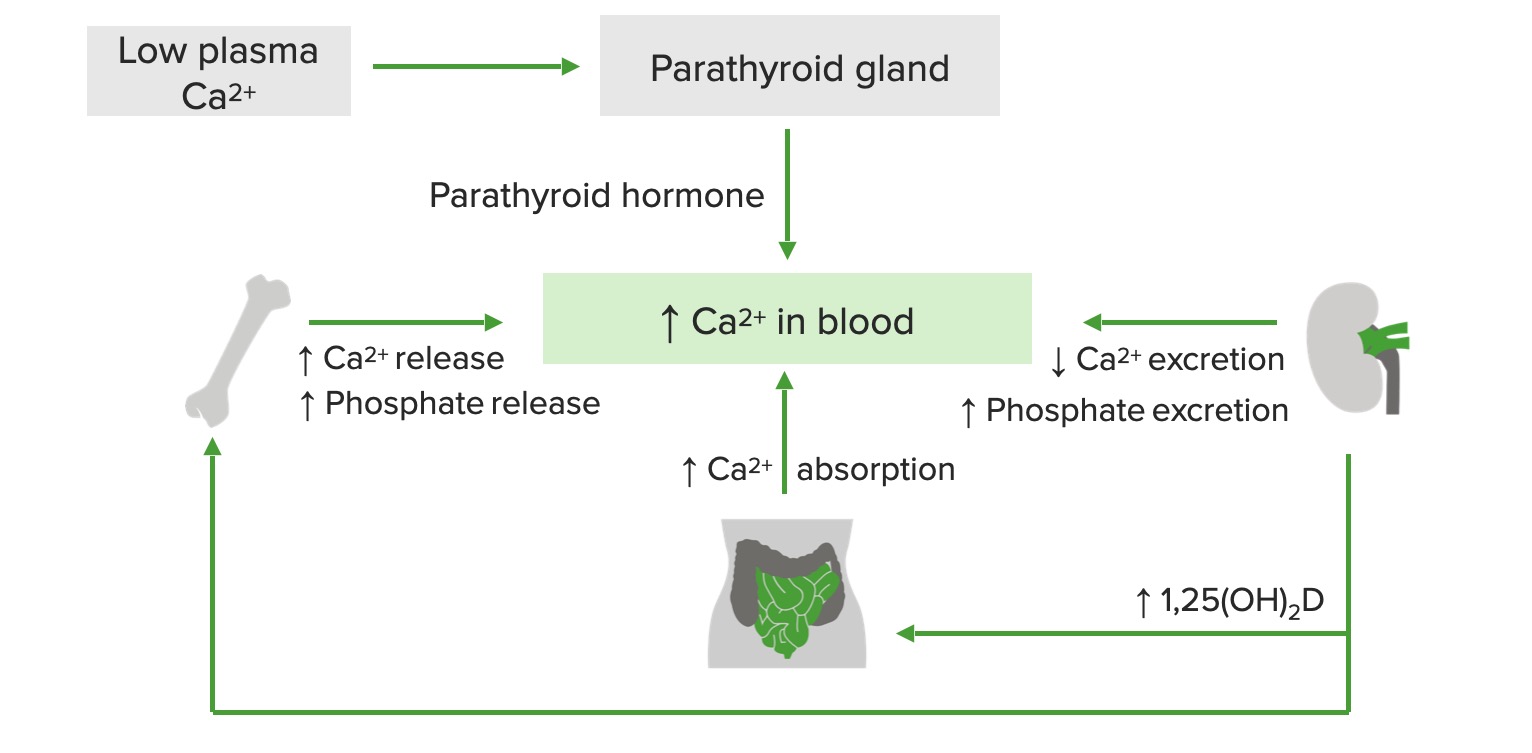Playlist
Show Playlist
Hide Playlist
Hypercalcemia in Children
-
Slides HypocalcemiaandHypercalcemia Pediatrics.pdf
-
Download Lecture Overview
00:01 Let's switch gears now and talk about hypercalcemia. 00:06 Hypercalcemia is a high level of calcium. 00:10 In infants this can present with vomiting. 00:14 It can present with dehydration from a polyuria resulting from calcium loss in the urine. 00:21 And you may see patients with hypercalcemia having dysmorphic facies such us with William syndrome as you can see on this child on the slide. 00:33 Patients with William syndrome in early infancy for reason is nobody understand can have profound hypercalcemia. 00:41 The symptoms of hypercalcemia in adults are usually stated as, stones, bones, groans and psychiatric overtones. 00:50 In children's, it does not work quite so well because the bones is really risk for bony fractures and the psychiatric overtones can just be irritability. 01:01 It's different depending on the age of the child. 01:04 Let's look at some of the more common causes of hypercalcemia. 01:10 In neonates and infants, one common problem is maternal hypocalcemia. The mother has a low calcium. 01:18 So when the baby is born the child has a reflexive high calcium for a period of time as the increased request for calcium continues to go to the bone. 01:30 Patients with William syndrome can have an unclear reason why but they can have a period of a hypercalcemia that last for several months during the infant period. 01:44 Patients can have familial hypocalciuric hypercalcemia where they have high calcium levels from a decrease excretion of calcium in the urine. 01:55 And unusually fat necrosis can actually cause a hypercalcemia. 02:01 In older children, there are other causes for hypercalcemia. 02:06 One is hyperparathyroidism, where the elevated parathyroid is simply encouraging more calcium to be deliberated into the blood. 02:15 We can see hyperparathyroidism in malignancy. 02:19 There are some tumors that consecrate a parathyroid hormone like protein that can cause a hypercalcemia. 02:28 Also, certain granulomas can cause increase levels of calcium such as sarcoid or tuberculosis, because of an increase conversion of vitamin D into the active metabolite. 02:41 And overdose of vitamins and medications can certainly cause hypercalcemia. 02:48 Increase vitamin D levels can cause hypercalcemia, increase vitamin A levels can cause hypercalcemia. 02:55 Thiazides can interfere with urinary excretion and cause hypercalcemia, and the lithium can cause hypercalcemia. 03:04 So let's say we have a patient with high calcium, what are we going to do? Well, the first question we ask is, what is the PTH? What is the parathyroid hormone level? Is it increased, is it decreased or is it normal. 03:21 So our first check is the parathyroid hormone level. 03:24 If it's increased the diagnoses is clear that this patient has hyperparathyroidism. 03:30 If it's decreased you might want to check a parathyroid hormone related peptide level. 03:37 This maybe a child who is suppressing their PTH with the high calcium and the high calcium is being liberated because of a tumor that's secreting a parathyroid hormone related peptide. 03:52 In the setting of normal parathyroid hormone that's when we might worry about something like familial hypocalciuric hypercalcemia. 04:02 For severe hypercalcemia the management is challenging at times. 04:11 We want to volume expand them to prevent there dehydration. 04:16 Calcitonin injections maybe indicated but watch out because repeated doses of calcitonin can actually cause a tachyphylaxis. 04:25 Bisphosphonates are indicated in this condition and this is one of the few times will use them in children. 04:32 Remember bisphosphonates have a host of side effects in adults and do in children as well. 04:38 In severe cases we all actually use dialysis. 04:42 Dialysis will dramatically and quickly reduce calcium levels in children. 04:47 Steroids maybe effective for granulomatous disease like sarcoid. 04:53 We would avoid steroid use in tuberculosis. 04:57 Parathyroidectomy would be indicated for patients with hyperparathyroidism. 05:04 That's a brief summary for you of both the hypocalcemic and the hypercalcemic state. 05:11 Thanks for paying attention
About the Lecture
The lecture Hypercalcemia in Children by Brian Alverson, MD is from the course Pediatric Endocrinology.
Included Quiz Questions
Which of the following is a cause of hypercalcemia in infants but not in older children?
- William’s syndrome
- Hyperparathyroidism
- Tuberculosis
- Sarcoidosis
- Lithium
Which of the following is NOT seen in pediatric hypercalcemia?
- Low intelligence
- Vomiting
- Dehydration
- Dysmorphic facies in William’s syndrome
- Irritability
A week-old child is diagnosed with hypercalcemia. Which of the following is the next best step?
- Ask about maternal hypocalcemia
- Repeat the test a week later
- Start calcium carbonate supplements
- Restrict milk in this baby until the calcium levels go down
- Start magnesium phosphate
Regarding the causes of hypercalcemia in older children, which of the following statements is FALSE?
- Increased vitamin A is the most common cause of hypercalcemia in older children
- Some tumours can cause hyperparathyroidism and thus increased calcium
- Granulomatous diseases also cause hypercalcemia
- Thiazides and lithium can cause hypercalcemia
- Hyperparathyroidism has to be ruled out in all children with hypercalcemia
You request calcium and PTH levels in a patient with suspected hypercalcemia. The labs report: increased calcium and decreased PTH levels. Which of the following is the next best step?
- Request PTHrP levels
- Check for a granuloma
- Check for FHH
- Request an MRI of the lung for malignancy
- Check urinary calcium
An 8-year-old patient has calcium levels of 16 mg/dl. Which of the following is NOT a therapeutic option?
- Blood transfusion
- Volume expansion
- Calcitonin injection
- Bisphosphonates
- Dialysis
Customer reviews
5,0 of 5 stars
| 5 Stars |
|
1 |
| 4 Stars |
|
0 |
| 3 Stars |
|
0 |
| 2 Stars |
|
0 |
| 1 Star |
|
0 |
Excellent lecture as usual. Easy to understand and remember. Thanks!





